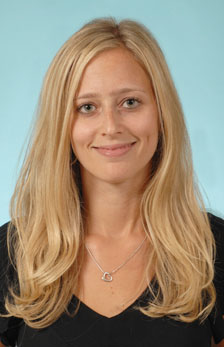Rehabilitation and Participation Science
Program in Occupational Therapy
 Rebecca Simon, MSOT/S ‘14
Rebecca Simon, MSOT/S ‘14Clinical/Community Track: Low Vision Laboratory
Why did you choose WUOT for your occupational therapy education?
When I was looking at different occupational therapy programs, I particularly enjoyed my visit to WUOT. I decided to go to school here because I was drawn to the high level of interaction with very accomplished faculty members, opportunities to get involved in research, and the chance to work collaboratively with peers from a variety of interesting backgrounds.
Why did you choose a clinical track experience for your master’s degree?
I chose the clinical track experience because I wanted to gain experience working in close contact with a population that I am interested in. I wanted to learn more about the unique challenges faced by the older adult population and the role of occupational therapists in working with older adults who have low vision.
Briefly describe your experience with the development of the Low Vision Self-Management program.
We began by learning about common low vision diagnoses and exploring the literature in regards to low vision, successful aging and self-management. We interviewed older adults with and without low vision. Then each lab member generated a topic for an individual session, which was combined with sessions created by last year’s lab group. This was followed by a focused literature review on our session topics and self-management leader training. We drafted our sessions and trialed them with members of a support group at St. Louis Society for the Blind and Visually Impaired. We revised and re-trialed our sessions based on feedback from the support group members.
How do you think this experience enhanced your clinical skills?
This experience enhanced my clinical skills by providing me with insight into the many ways that low vision can impact the function and participation of older adults. Our lab had the valuable opportunity to hear first-hand about the experiences of the members of the support group. This included some of the major challenges that this population faces and strategies that can be used for coping with these challenges. I am now more aware of the potential areas of life that can be impacted by low vision. My glimpse into the lives of the individuals in the support group has taught me that low vision can impact individuals uniquely and each person will have different priorities and use different strategies to cope with vision loss.
I also learned how to interact more effectively with older adults with low vision by doing things such as lightly touching them on the shoulder, making sure to state my name before I begin speaking to them and verbally describing what is going on. This experience also helped me learn how to effectively run groups and manage group dynamics so that each participant feels valued.
How did you feel about the guidance provided by Dr. Perlmutter?
The guidance provided by Dr. Perlmutter was great. She has so much experience and the knowledge that she shared was crucial to helping us develop and shape relevant and effective program sessions. At the same time, she allowed us enough independence to be creative and make our sessions our own. She also set a wonderful example of how to interact with older adults with low vision.
How would you describe this experience to prospective students who may be interested in community practice?
I would highly recommend the clinical track. I feel very lucky to have had the chance interact with a population that I am interested in working with and to learn about how low vision (a very common challenge for older adults) can impact daily activities and community participation.
How will these experiences affect or influence your career direction after graduation?
I was always pretty sure that I wanted to work with older adults and my experience in the Low Vision Lab has confirmed this. My increased knowledge of low vision diagnoses will be very useful since low vision impacts a significant amount of the older adult population. I am sure that I will encounter many clients with low vision and I am looking forward to working with them to help them continue to safely participate in meaningful activities.
We welcome inquiries from prospective students, potential collaborators, community partners, alumni and others who want to connect with us. Please complete the form below to begin the conversation.
Schedule an Info Session
We are excited that you are considering applying to the Program in Occupational Therapy at Washington University. Please join us for a Zoom Information Session for either our entry-level MSOT or OTD degrees or our online Post-Professional OTD. Current faculty members will discuss the degree program and answer any question you may have. We are offering these sessions on the following days and times. The content is the same for each one, so you only need to sign up for one.
Upcoming ENTRY-LEVEL Degree ZOOM Info sessions:
Schedule an Entry-Level Info Session
Upcoming PP-OTD Degree ZOOM Info session: